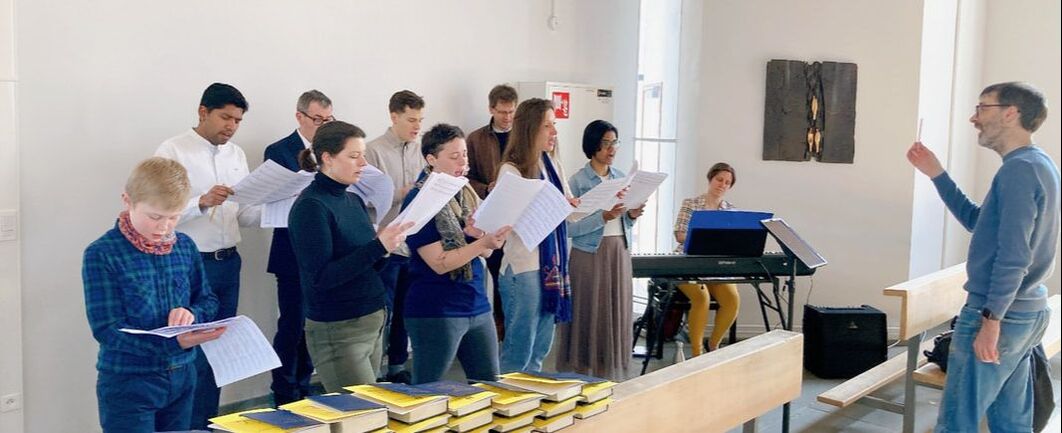Choral music is central to the Anglican tradition and from time to time we gather singers together to form a small choir to accompany our services. Please keep an eye on our newsletter for the next opportunity to sing together!
A brief history of evensong
The service of sung evening prayer, or ‘evensong’, is unique to the Church of England.
It was invented in 1549 by Archbishop Thomas Cranmer, an English church reformer, during a time of violent disagreement between Catholics and Protestants about the future direction of the church that was being newly created in England.
Cranmer wanted to design an evening service which ordinary people would actually want to go to. His idea was to create a new service by combining parts of Vespers and Compline, two ancient services from the daily worship schedule used in Catholic monasteries.
Cranmer wanted his new service to have the following features:
• It should be short.
• It should be in English, so people could understand it (a key Protestant idea).
• It should not demand anything specific of the congregation. In particular, they should not be expected to take part in any ritual (another Protestant idea), but rather allowed to reflect and contemplate privately, in a calm and worshipful atmosphere.
• All the texts used should be Biblical in origin.
• It should highlight the Jewish roots of Christian traditions – an element which Cranmer felt was missing from the Catholic Mass.
• Also unlike Mass, it should not require the attendance of a priest, only a few singers. This was a sensitive theological topic at the time, but it also has practical implications: if no priest was needed, a service could be held every day even in village churches.
From the seventeenth century until the present day, most Anglican cathedrals have held a service of evensong every day, and many smaller churches still sing a service once a week or once a month. These services all use Cranmer’s original words, basically unchanged.
Five centuries after its creation, Cranmer’s idea of a service that people would actually want to go to has proved more successful than he could possibly have imagined. Today, cathedral evensongs are some of the most well-attended services in England. As general church attendance has declined in the past 50 years, attendance at these services in cathedrals continues to grow.
BBC radio has broadcast a service of choral evensong every week since 1926. It is one of the longest-running radio broadcasts in the world.
Choral music at evensong
1. Responses: call and response between a minister or soloist and the choir
2. Psalm(s): biblical songs, chanted in a musical style unique to the Anglican church
3. Canticles: two longer songs using specific Biblical texts (‘Magnificat’ and ‘Nunc dimittis’)
4. Anthem: a longer choral piece, freely chosen to fit the theme of the service
5. Hymn (a modern edition): a simple song for the congregation to join in with
Text courtesy of professional choir director Toby Wardman.
It was invented in 1549 by Archbishop Thomas Cranmer, an English church reformer, during a time of violent disagreement between Catholics and Protestants about the future direction of the church that was being newly created in England.
Cranmer wanted to design an evening service which ordinary people would actually want to go to. His idea was to create a new service by combining parts of Vespers and Compline, two ancient services from the daily worship schedule used in Catholic monasteries.
Cranmer wanted his new service to have the following features:
• It should be short.
• It should be in English, so people could understand it (a key Protestant idea).
• It should not demand anything specific of the congregation. In particular, they should not be expected to take part in any ritual (another Protestant idea), but rather allowed to reflect and contemplate privately, in a calm and worshipful atmosphere.
• All the texts used should be Biblical in origin.
• It should highlight the Jewish roots of Christian traditions – an element which Cranmer felt was missing from the Catholic Mass.
• Also unlike Mass, it should not require the attendance of a priest, only a few singers. This was a sensitive theological topic at the time, but it also has practical implications: if no priest was needed, a service could be held every day even in village churches.
From the seventeenth century until the present day, most Anglican cathedrals have held a service of evensong every day, and many smaller churches still sing a service once a week or once a month. These services all use Cranmer’s original words, basically unchanged.
Five centuries after its creation, Cranmer’s idea of a service that people would actually want to go to has proved more successful than he could possibly have imagined. Today, cathedral evensongs are some of the most well-attended services in England. As general church attendance has declined in the past 50 years, attendance at these services in cathedrals continues to grow.
BBC radio has broadcast a service of choral evensong every week since 1926. It is one of the longest-running radio broadcasts in the world.
Choral music at evensong
1. Responses: call and response between a minister or soloist and the choir
2. Psalm(s): biblical songs, chanted in a musical style unique to the Anglican church
3. Canticles: two longer songs using specific Biblical texts (‘Magnificat’ and ‘Nunc dimittis’)
4. Anthem: a longer choral piece, freely chosen to fit the theme of the service
5. Hymn (a modern edition): a simple song for the congregation to join in with
Text courtesy of professional choir director Toby Wardman.


